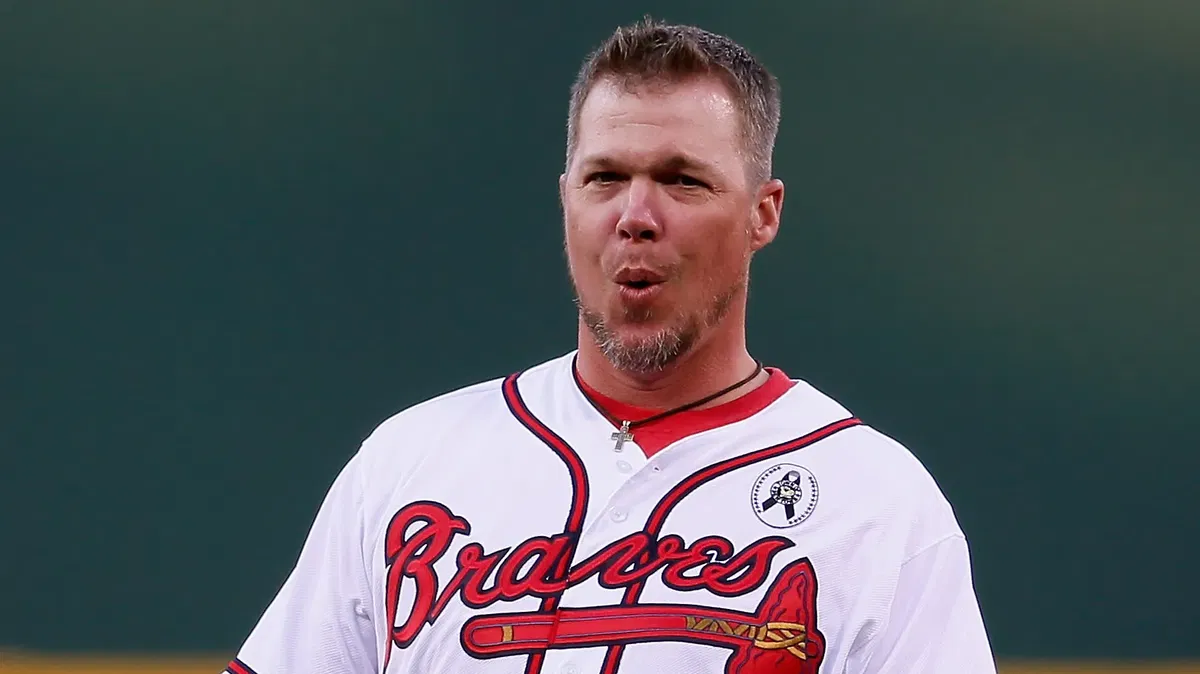

It was just another spring morning in Florida, bats cracking, cleats crunching, and routines unfolding like clockwork. Chipper Jones, the Braves’ young switch-hitting phenom, was easing into his groove. A few solid left-handed swings in the cage, some nods of approval, and he called it a wrap. Or so he thought. What happened next wasn’t part of any plan. But it ended up rewriting his approach, and maybe even his career.
Watch What’s Trending Now!
Standing nearby was Don Baylor. A former MVP, manager, and one of the most respected men in baseball. Baylor wasn’t interested in letting comfort slip by disguised as preparation. As Chipper stepped out of the cage, Baylor’s voice cut through the spring air. “You’re not done. You’re not leaving this cage until you hit right-handed to my liking.” It was a test, and Jones quickly realized he was being evaluated for more than just mechanics.
“So I stayed in there for another eight or 10 minutes, and I hit right-handed,” Chipper Jones recalled years later. “And Baylor goes, ‘Mm-hmm, nope. I wanna hear your philosophy right-handed.’ I told him, ‘They turn me around a lot because it’s not my power side. I’m just trying to hit singles and doubles in the gap.’ Oh, he did not like that. He looked me dead in the eye and said, ‘You hit third for the best team in the National League. People need to fear you. I fear you left-handed. I don’t fear you, right-handed. We’re gonna fix that.”
"That change in attitude from the right side, it put me in a different class."
🏦 Chipper Jones joins @JonMorosi on "The Road to Cooperstown", the official podcast of the @baseballhall#Braves | #BravesCountry | @RealCJ10
DOWNLOAD 🔗 https://t.co/I328Hm94d7 pic.twitter.com/w61WzuHabL— MLB Network Radio on SiriusXM (@MLBNetworkRadio) June 10, 2025
That wasn’t just a hitting critique; it was a challenge to his identity at the plate. And it struck deep. For a player who had long relied on feel and flow, Baylor’s words forced a shift in mindset: Stop surviving and start dominating, from both sides.
From that moment forward, Chipper Jones’ right-handed approach transformed. He didn’t just try to “spray it around” anymore; he hunted. He imposed. And pitchers took notice. The numbers followed suit, but it was the mentality that made the biggest leap.
Looking back, Jones doesn’t hesitate to pinpoint that conversation as a turning point. “That change in attitude from the right side put me into a different class.”
Baseball is a game of moments. Some happen under stadium lights, others in the quiet corners of spring training. For Chipper Jones, it was a blunt talk in a batting cage that became the loudest message of his career.
Chipper Jones from good to great: The results showed
What changed wasn’t just in Chipper’s swing; it was in his eyes. After that unforgettable talk with Don Baylor, he didn’t step into the box just to make contact anymore. He stepped in to do damage.
Chipper Jones exploded in late September 1999 when the Braves faced their fiercest rival. Decked out in base‑clearing power, he launched four home runs across a three‑game sweep of the Mets, two in Game 1, and one each in Games 2 and 3. He snatched back momentum and helped Atlanta claim the division crown. It wasn’t a one‑off pop; it was the signal that his right‑handed presence now packed punch. Opponents who once scouted him as a left‑side slugger had to rethink their entire game plan.
Fast forward to the Aught‑X NLDS opener: Chipper ambled to the plate in a big spot against Houston’s bullpen. Pinch‑hit for Billy Wagner, he belted a surprising three‑run homer, right‑handed to break a 0‑for pattern and fuel a 7‑4 lead. Analysts called it a gutsy gamble; fans called it the moment when his weaker side became genuinely dangerous. That inning didn’t just win a game; it rewrote how pitchers viewed him.
You don’t get .300 average and .500 slugging from both sides without serious mettle. Yet that’s exactly what Chipper Jones became: One of only two switch‑hitters to reach .300/.391/.499 right‑handed and .304/.405/.542 left‑handed over a career. Those numbers don’t lie. When scouts said he was a feel hitter, his stats screamed: “Think again.”
The guy who once felt comfortable with singles and gaps became a full‑blown threat from the right side, game after game. And all of that traces back to a spring training wake‑up call that changed everything.

